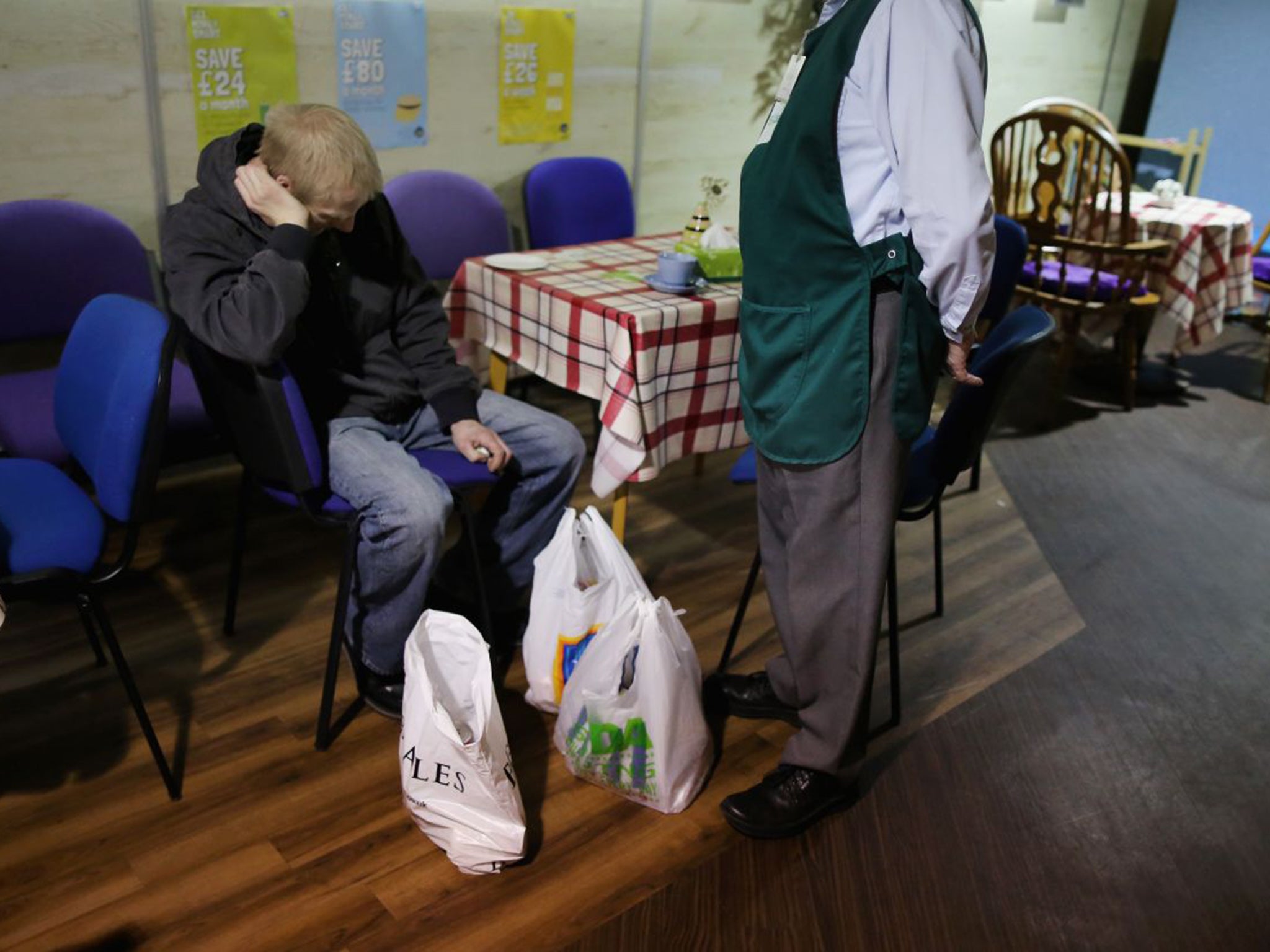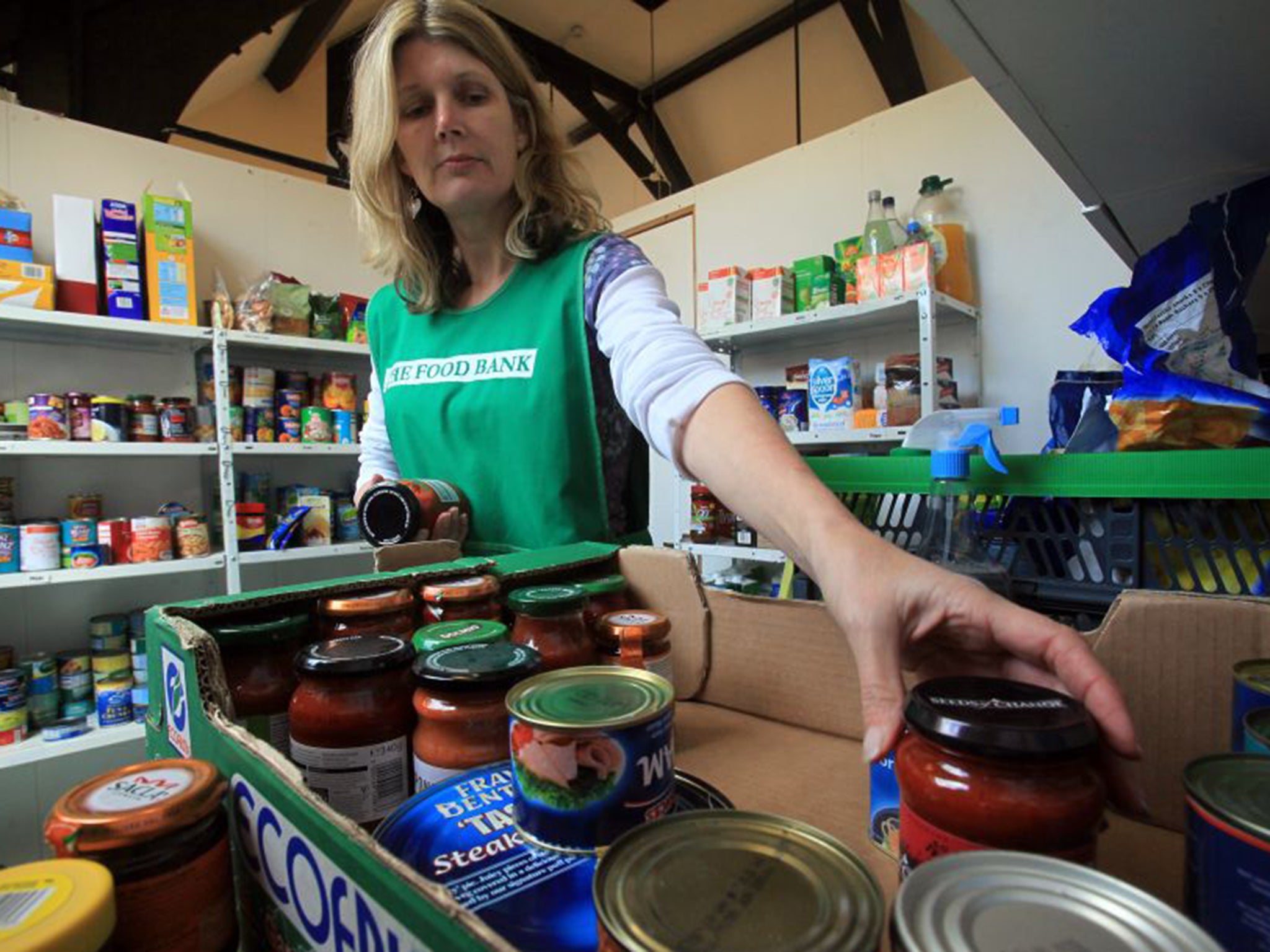Jobless are being punished with hunger for claiming unemployment benefit, say churches
Coalition accused of using 'deliberate destitution' against claimants who miss meetings

Your support helps us to tell the story
From reproductive rights to climate change to Big Tech, The Independent is on the ground when the story is developing. Whether it's investigating the financials of Elon Musk's pro-Trump PAC or producing our latest documentary, 'The A Word', which shines a light on the American women fighting for reproductive rights, we know how important it is to parse out the facts from the messaging.
At such a critical moment in US history, we need reporters on the ground. Your donation allows us to keep sending journalists to speak to both sides of the story.
The Independent is trusted by Americans across the entire political spectrum. And unlike many other quality news outlets, we choose not to lock Americans out of our reporting and analysis with paywalls. We believe quality journalism should be available to everyone, paid for by those who can afford it.
Your support makes all the difference.Two churches have launched a blistering attack on the Government for using hunger as a punishment for people claiming unemployment benefit, warning that using benefit sanctions to reprimand claimants who miss meetings or fail to look for jobs amounts to a policy of “deliberate destitution”.
In a joint written submission to MPs, the Methodist church and United Reformed Church say the Government is presiding over a benefits system that places a harsher punishment on people who have the misfortune to be unemployed than those found guilty of committing a crime. The maximum penalty possible – removal of living expenses excluding housing benefit for three years – represents a loss of £11,000, while the largest fine imposed by the criminal justice system is £5,000.
In evidence to the work and pensions select committee published this week, they state: “The use of hunger as a penalty is simply unacceptable. It is extraordinary that the state would choose to punish lateness to appointments or sub-optimal job searching in such a way. The criminal justice system, when [it] fines or imprisons, ensures a person’s basic needs are met – there can be no argument, moral or utilitarian, that justifies a policy of deliberate destitution.”
The churches claim sanctions have left some people unable to buy food for more than a week, and have led to shoplifting, isolation and physical and mental health conditions. “The human cost of the sanctions system is extremely high,” the submission says. “One group we spoke with contained people who had received long (six-month plus) sanctions and who had considered taking their own lives.”
Sanctions can also have a devastating impact on claimants’ ability to look for work, as “the horizons of people who have received a sanction dramatically shrink to focus on the immediate problems of finding the next meal”.

The Department for Work and Pensions (DWP) said yesterday that only a very small percentage of benefit claimants were sanctioned. But churches warn that large numbers of those who are sanctioned go on to face long-term stoppage of their benefits. The churches say original government estimates were that fewer than 1,000 people a year would be sanctioned for a month, yet last year more than 800,000 claimants were sanctioned for a month or longer.
Benefits are often withheld for spurious reasons. In December the food bank charity the Trussell Trust told MPs on the committee it had supported people who had had their benefits docked for failing to attend a course they had actually turned up to. Others said they were sanctioned for attending the funeral of a close friend rather than going to a routine Jobcentre meeting.
MPs have also been shown evidence that young men are more likely to face the punishment than other job seekers. Statistics from the New Policy Institute (NPI) think-tank show that more than one in three claims made by men are sanctioned, but less than one in four of those made by women. Half of claims made by those aged under 25 and referred to the sanctions system result in a sanction being imposed.
Tom MacInnes, of the NPI, said if young people or their friends were sanctioned before they had ever had a job it could prevent them reaching out for support, leaving them unemployed for longer.
“Your essential first experiences with the Jobcentre are likely to be negative … and more adversarial. What you’re going to have is a generation of people who are going through this system and are having a completely different experience than others and [they] might go elsewhere for support and advice.”
Kirsty McHugh, of the Employment Related Services Association, which represents welfare-to-work providers, agreed. “You’re far more likely to get somebody into work if you have got a good relationship with them,” she said. “Once somebody gets to the point of self-belief that they can work, that they want to work, it’s almost job done. You really have to build up the confidence and determination. The threat of a sanction is really going to stop that happening. It can be counterproductive.”
She said employment advisers should be given more discretion to decide when to suspend payments.
“There are some people who are sanctioned again and again, and there doesn’t seem to be a process where they examine what’s going on. Is that person working, and therefore they don’t really care enough? Is there a mental health condition or are they living a chaotic life? If they’re sanctioned repeatedly and it’s not having an effect that needs to be investigated,” she said.
A DWP spokesman said: “These [sanction] decisions aren’t taken lightly, and anyone who disagrees with the decision has the right to appeal… We have a well-established hardship payment fund for people who need it.”
Join our commenting forum
Join thought-provoking conversations, follow other Independent readers and see their replies
Comments